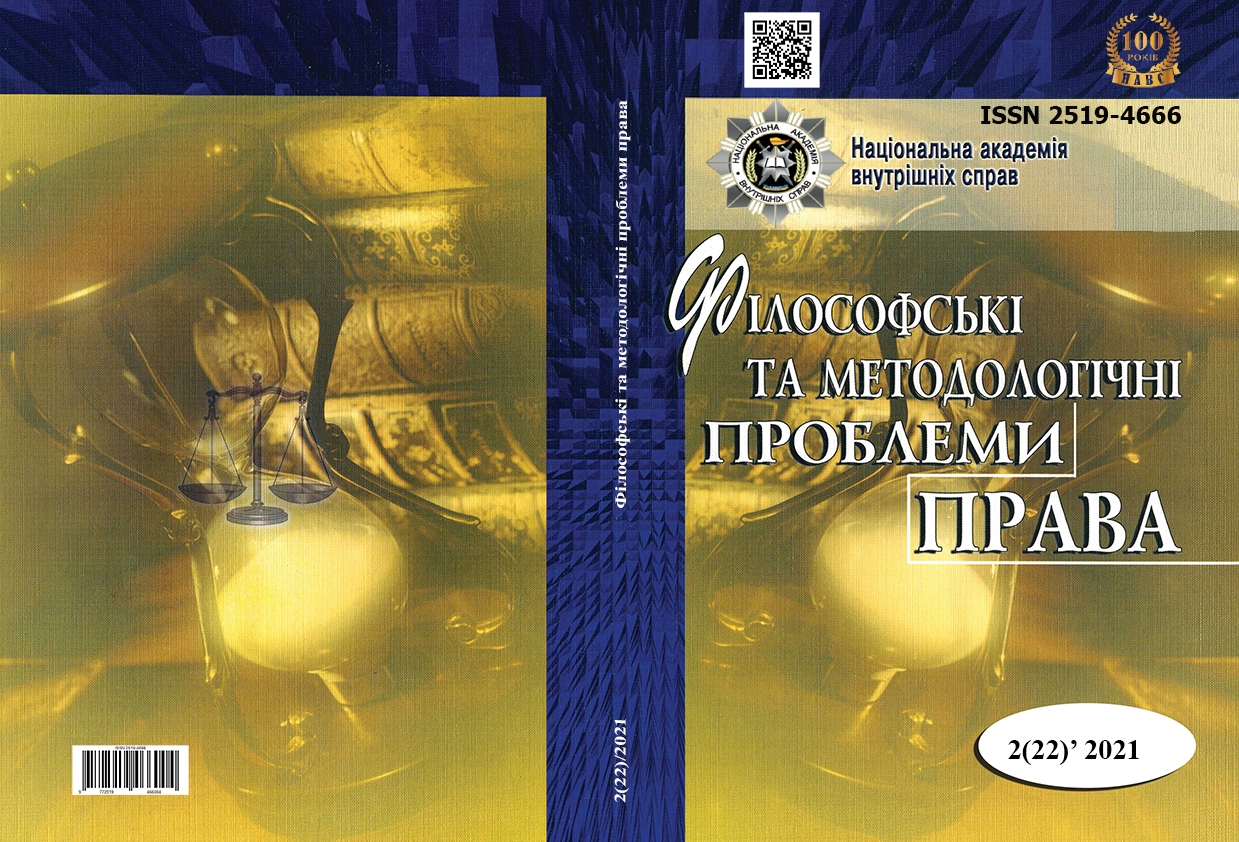Formal and Informal Aspects of Investigational Logic
Abstract
The purpose of the article consists in defining the conditions of rational combination of formal and informal aspects of logical analysis, aimed at the optimization of investigative strategies. Methodology. The method of comparative analysis is used for the exposure of sources of basic contradictions, traced in the most widespread methodological approaches to decision of the examined problem in modern literature. Based on the method of semantic analysis, the conditions of effectiveness of various logical and methodological tools in the field of investigative activities are determined.The methods of logical modeling, generalization and formalization are used during the elaboration of conceptual foundations and technological models of effective using of formal and informal analytical approaches in investigative practice. Scientific novelty. The article clarifies the relationship between the methodological functions and defines the relevance conditions of formal and informal approaches to logical analysis; in addition, it contains the model of effective combination of such approaches during the elaboration and optimization of investigative strategies. Conclusions. Formal and informal approaches to logical analysis of investigative activity are characterized by the presence of both their advantages and the corresponding methodological limitations. Therefore, in the practice of investigation, a coordinated combination of mentioned approaches in accordance with the conditions of their relevance and effective application is appropriate. Such conditions are determined by a logical model of building strategies of the investigative process, which presents the dynamics of its development in the form of a chronological sequence of synchronized states of the «picture» of the investigated events, which allows not only substantive but also structural and formal analysis.
Keywords: investigative methodology; formal and informal analysis; semantic bases of logical methods; logic of investigation; investigative strategy; logical analysis of versions; technology of logical arrangement of investigation.
Downloads
References
Dagan H. The New Legal Realism and The Realist View of Law. Law & Social Inquiry.2018. Vol. 43. Issue 02.
P. 528–553.doi: https://doi.org/10.1111/lsi.12319.
Girod R. Logical Investigative Methods: Critical Thinking and Reasoning for Successful Investigations. N.Y. : CRC Press, 2015. 270 p. doi: https://doi.org/10.1111/lsi.12319.
Грифцова И. Неформальная логика в контексте современной философии познания. Философские науки. 2011.№ 4. С. 199–206.
Гвоздік О. Критерії достатності доказів. Філософські та методологічні проблеми права. 2019. № 2 (18). С. 63–70. doi: https://doi.org/10.33270/02191802.63.
Гвоздік О. Логіко-семантичний аспект побудови стратегій розслідування. Філософські та методологічні проблеми права. 2020. № 2 (20). С. 86–92. doi: https://doi.org/10.33270/02202002.86.
Johnson R. H., Blair J. A. Informallogic: Anoverview.InformalLogic. 2000. Vol. 20. No. 2. P. 93–99.
Хинтикка Я. Логико-эпистемологические исследования. М. : Прогресс, 1980. 448 с. doi: https://vk.com/ doc370716055_604214589.
Хоменко И. Теоретические проблемы неформальной логики: конфликты точек зрения. Эпистемология и философия науки. 2013. Т. ХХХVІІ. № 3. С. 85–98.
Колодіна А. Екстраполяція принципів окремих методик розслідування у слідчу діяльність. Підприємництво, господарство і право. 2019. № 11. С. 355–361. (Серія «Криміналістика»). doi: https://doi.org/10.32849/2663-5313/2019.11.61.
McCann M. Preface to The New Legal Realism. Vol. I and II. Cambridge University Press, 2016. doi: https://doi.org/10.1017/CBO9781139683432.001.
Palcu Р., Morostes А. Profiling as a logical form of reasoning in order to solve controversial circumstances on the crime scene. Journal of legal studies. 2016. Vol. 17. No. 31. P. 46–57. doi: https://doi.org/10.1515/jles-2016-0005.
Pardo M. S. The paradoxes of legal proof: A critical guide. Boston University Law Review. 2019. Vol. 99. P. 233–290. doi: https://ssrn.com/abstract=3293023.
Petherick W. Logic and Reasoning in Crime Analysis. Applied Crime Analysis.2015. P. 14–38. doi: https://doi.org/10.1016/B978-0-323-29460-7.00002-8.
Тягло А. О стандартах доказательства. Форум права. 2018. № 1. С. 88–94. doi: http://doi.org/10.5281/zenodo.1239007.
Walton D. N. A Handbook for Critical Argument.Cambridge University Press, 1989. 292 p.
Walton D. N. Informal logic: a pragmatic approach. 2nd ed. Cambridge University Press, 2008. 345 p.
Abstract views: 260 PDF Downloads: 350
Copyright (c) 2022 Philosophical and Methodological Problems of Law

This work is licensed under a Creative Commons Attribution-NonCommercial-NoDerivatives 4.0 International License.
- Authors reserve the right to authorship of their own work and transfer to the magazine the right of the first publication of this work under the terms of the Creative Commons Attribution License, which allows other persons to freely distribute published work with mandatory reference to authors of the original work and the first publication of an article in this magazine.
- Authors have the right to enter into separate additional agreements on non-exclusive dissemination of the work in the form in which it was published in the journal (for example, to post an article in the institution's repository or to publish as part of a monograph), provided that the link to the first publication of the work in this journal is maintained.
- The journal's policy allows and encourages the posting of articles by authors on the Internet (for example, in electronic storehouses of institutions or on personal websites), both before the submission of this manuscript to the editorial office and during its editorial processing, as this contributes to the creation of a productive scientific discussion and positively affects the efficiency and dynamics of citing the published work.




